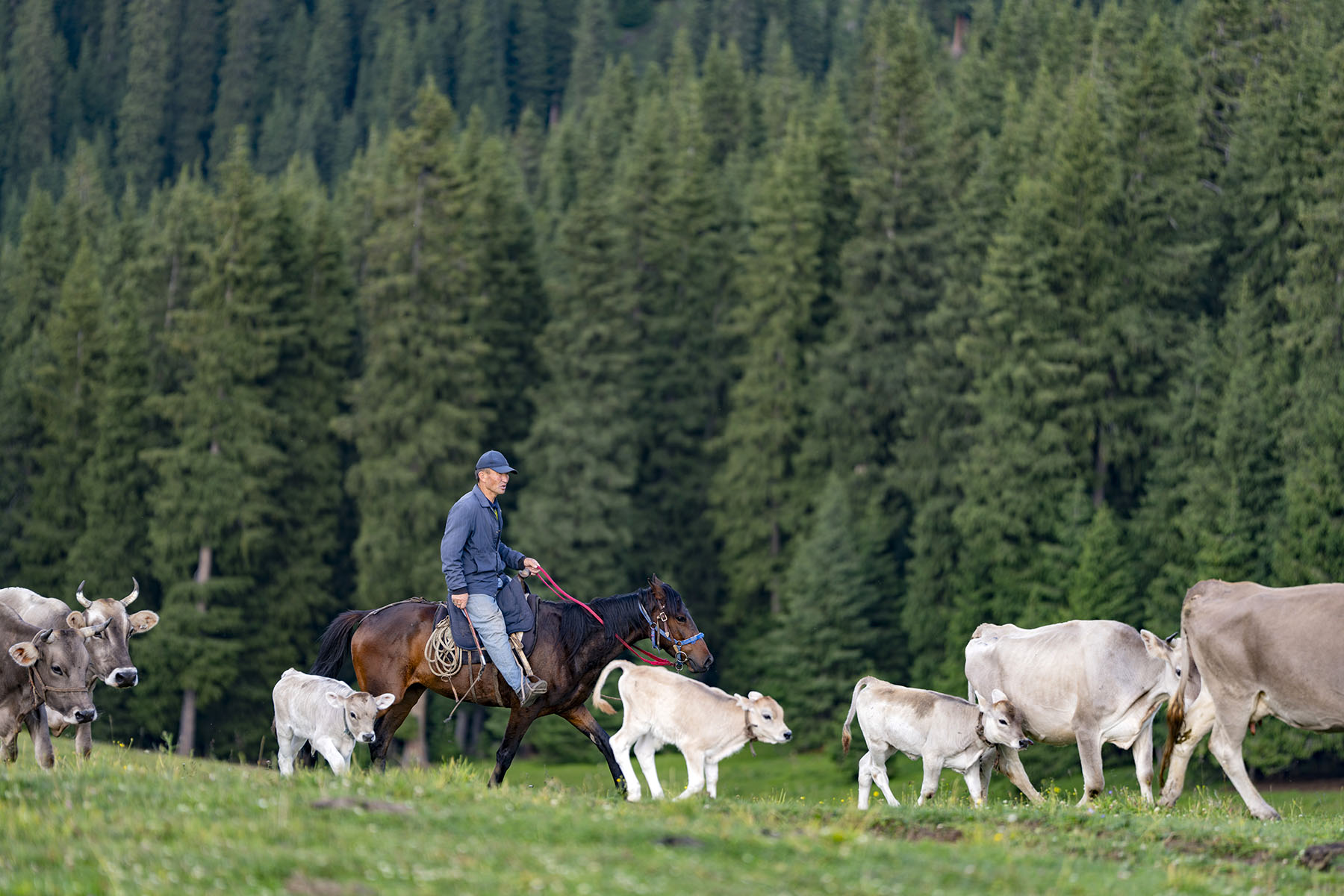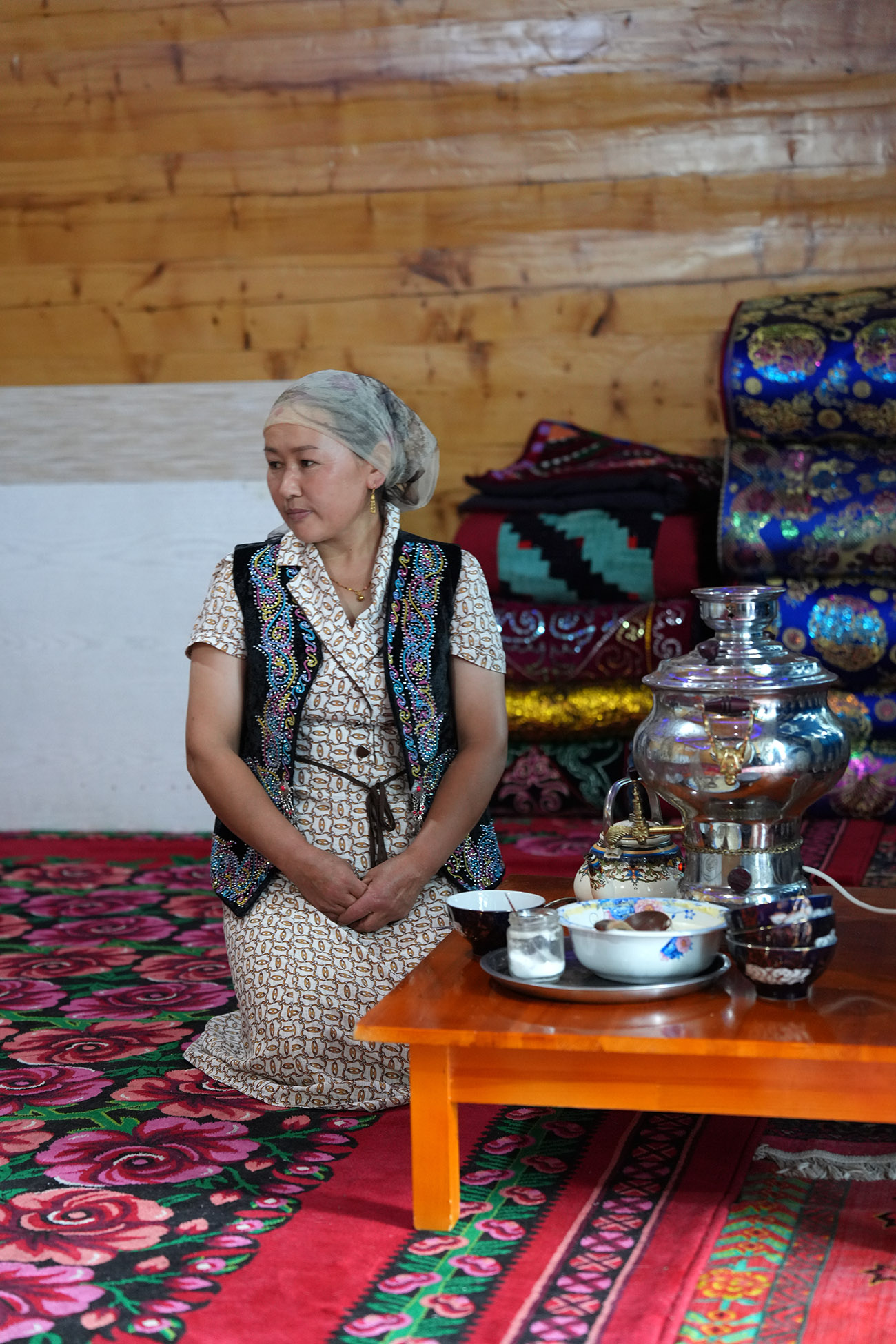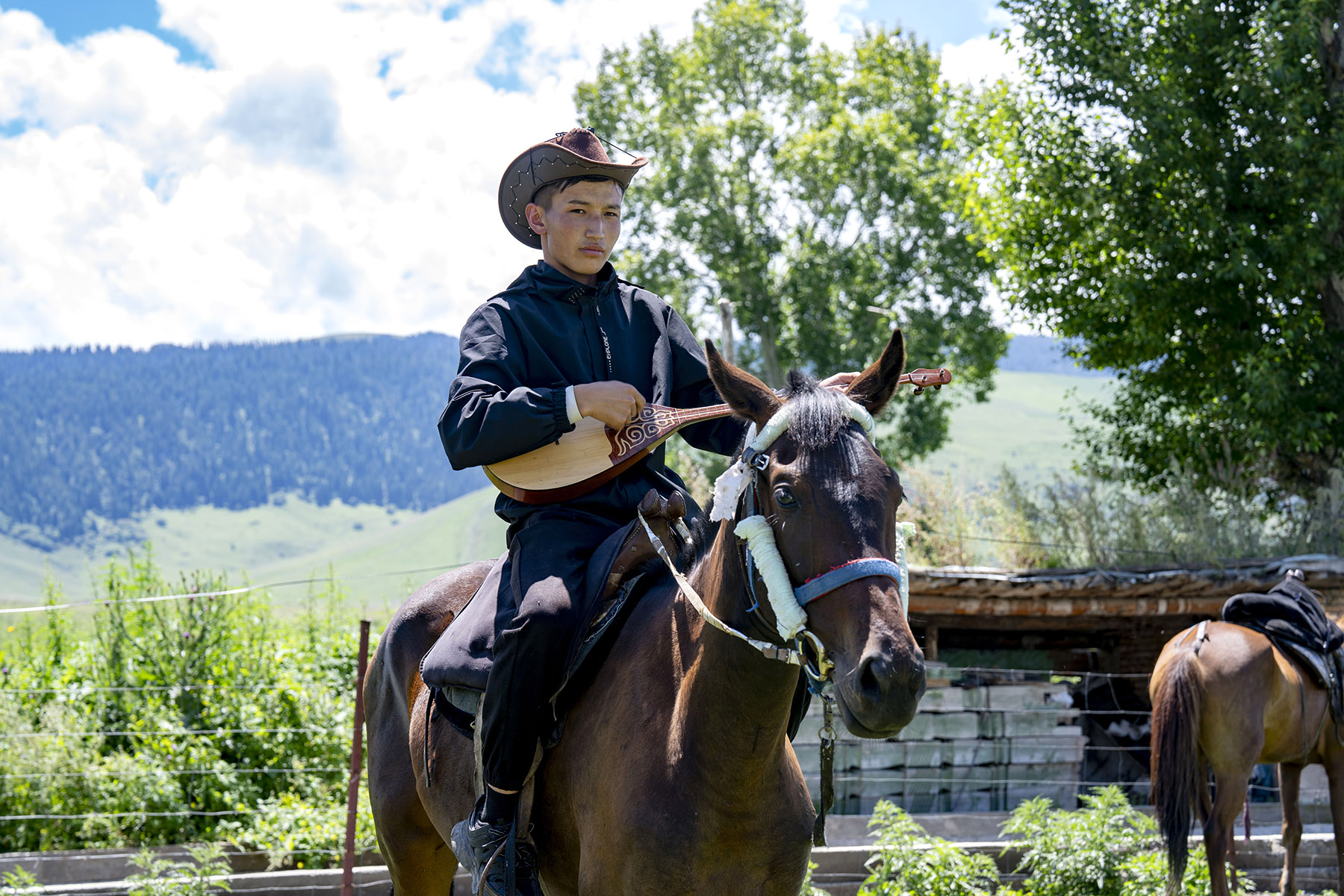Traditional herders put their love of horses above all else in Xinjiang's Zhaosu county

Editor's Note: Improved infrastructure, policy support and funding in areas with large populations of different ethnic groups have transformed people's lives. China Daily presents a series of stories about how China is determined to leave no ethnic group behind in the country's development, while inspiring them to embark on a new journey and make achievements in the new era. This article is the second installment, focusing on traditional Kazak lifestyle.
When Yeran Nurborat rides his horse Smoky back to his family's summer pasture on a stretch of grassland at the foot of a snowcapped mountain in Zhaosu county, Xinjiang Uygur autonomous region, all his troubles go away, he said.
The pasture is only accessible by horse or motorcycle via a steep, narrow path, allowing the 20-year-old herder of the Kazak ethnic group to retain a little oasis preserving his traditional roots.
Those who make the three-hour journey will pass herds of horses wandering freely on the slopes of the mountains and through forests of tall pine trees.
READ MORE: Preserving Kazak culture, stitch by stitch
At the end of the uphill journey, the view opens up to reveal a vast green pasture spattered with yellow flowers and snowcapped mountains behind.
When the Yili horses — a special breed of horse found in Xinjiang — raised by Yeran's family gallop the pasture it looks as if they are running on the clouds. It's no wonder why horses in Zhaosu, Ili Kazak autonomous prefecture, are affectionately dubbed "heavenly horses".
"This place may seem like a wonderland to outsiders, but it's just our home, which we cherish," Yeran said while sipping a cup of traditional Kazak milk tea at the wooden house where his family stays during the summer.
Like Yeran, many young people from the Kazak ethnic group in Zhaosu are determined to retain the unbreakable bond they have connecting humans, nature and culture. In recent years, as tourism picks up and the power of social media takes off, these young people want others to learn about herders and what they have learned with each generation.
Zhaosu lies on the western flank of Xinjiang, within the verdant valleys of the Ili River. Its picture-perfect alpine pastures nestle amid the grand Tianshan mountain range. Differing from Kazak herdsmen in other parts of Xinjiang who use horses to herd sheep, Zhaosu people are known for breeding Yili horses.
With top-quality grassland and the people's passion and love for horses, the county is often referred to as "horse heaven" by people in the know. As of the end of last year, Zhaosu had almost as many horses as it had people — 177,000 residents to 121,500 steeds.
"The Kazaks have an old saying that 'horses are the wings of man'. We see them as our family members so it's our duty to take care of them," Yeran said while watching two-year-old Smoky frolic on the grassland. His family owns more than 40 horses.

Yeran said because raising horses is his passion, he's decided to carry on the family tradition, which the modern world still has a place for. The family can receive an annual income of about 100,000 yuan ($14,000) for selling horses used for racing.
He said he doesn't envy the life in cities, as spending time around nature allows people to stay healthy both physically and mentally. "I ride my horse when I feel happy. Also, whenever I feel down, I take my horse for a ride toward the mountain at full speed. My spirit is instantly lifted."
People in Zhaosu respect nature and know how to keep a balance between raising horses and protecting the environment. They live on the pasture high up in the mountains during the summer with their livestock, and move down to their settlements in lower areas in the winter.
The recently popular TV series To The Wonder, based on the adaptation of the novel My Altay by author Li Juan has put the spotlight on the nomadic life of the Kazaks in Altay prefecture in Xinjiang.
Central to the series is its portrayal of the clash between tradition and modernity among the local people, a theme that also resonates deeply in other parts of the world.
"The clashes do exist in real life, but we won't lose our traditions no matter what because they are in our blood just like we are born horse riders," said Yeran, who plays the dombra, a Kazak traditional musical instrument in his free time.

The TV series has caught the imaginations of young Chinese yearning to escape the grind of life in the country's major cities, and triggered a spike in tourism to pastures in Xinjiang, including Zhaosu. Young Kazaks like Yeran want to capitalize on this opportunity.
"I want to open up a homestay on our summer pasture so people can experience the life of a Kazak nomad and learn about the Kazak culture, as well as visit tourist spots where they can only enjoy the beautiful scenery," he said. "I hope I can offer them experiences of a different way of living."
In Zhaosu, every boy from the Kazak ethnic group receives a horse as a gift when they reach the age of four or five. They are taught how to ride horses before they can walk, said Galin Nurbarhat who started horse racing when he was a boy.
The 24-year-old is currently studying at a university in Urumqi, capital of Xinjiang. He always wants to get home as soon as possible during vacations so he can be with the horses.
"No matter what my profession will be in the future, my love for horses will never change. Horses are loved and respected in Zhaosu as they are also seen as residents of the county," said Galin, who helps out at his uncle's horse farm.
One of his uncle's horses took part in a race at the equestrian events of the 12th National Traditional Games of Ethnic Minorities of China held at the Tianma Tourism and Cultural Park in Zhaosu from July 8 to 13.
Participants from various ethnic groups showcased their horse-riding skills at events including horse racing, horseback archery and hada snatching, drawing waves of amazement from the crowd at the venue and online.

The ethnic games also include exhibition events such as diaoyang, or snatching the sheep, a traditional sport of the Kazak ethnic group. During the competition, which is similar to buzkashi in Central Asia, two teams of riders try to grab a headless sheep. They either tuck it under their saddle or carry it on their horses, while other participants chase and attempt to snatch the sheep from them. Through repeated struggles, the team that finally places the sheep at the designated location is declared the winner.
"We take the game of diaoyang very seriously and have a special saddle for it. The sheep is normally offered by people who have something to celebrate, such as a wedding, especially in the winter. You need to be strong and an exceptional rider to take part, so it always feels great to become a winner," said Galin, who's won such events multiple times.
While young people are keeping Zhaosu's rich equestrian heritage alive, a boom in the county's modern equine industry has brought local young people more career opportunities.
ALSO READ: Off to a galloping start
The county's summer horse drive, which involves a grand spectacle of thousands of steeds setting off from the Tianma tourism and cultural park to gallop across Zhaosu's flower-filled steppe, has become a major calling card, topping viewing lists on social media platforms nationwide.
Lashan Yibasar, 18, is an equestrian performer at the park, which also offers visitors equestrian shows put together by locals. Besides taking part in daily performances, Lashan has been training hard to improve her skills in equestrian vaulting, which is described as gymnastics on horseback.
The only downside of her job is that she cannot see her own horse Black Eye, which is kept at her home, she said. "When I video call my parents, I often ask them to take the phone to the stable so I can see Black Eye and talk to him for a bit because I miss him a lot," she said.
"I do my job with joy, enthusiasm and happiness because I can be around horses all the time," Lashan said. "More importantly, I want the world to see that people from the Kazak ethnic group in Zhaosu are the best horse riders. It's also a good way to promote the traditional Kazak culture, which the young people are all very proud of."
In the first half of this year, Zhaosu received 2.98 million visits from domestic tourists, generating a revenue of some 1.12 billion yuan, an increase of more than 22.3 percent year-on-year.


